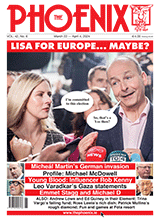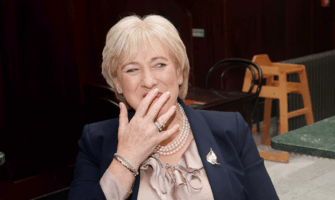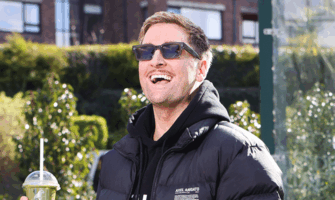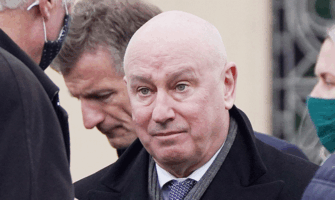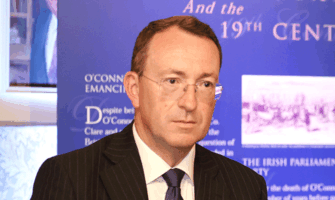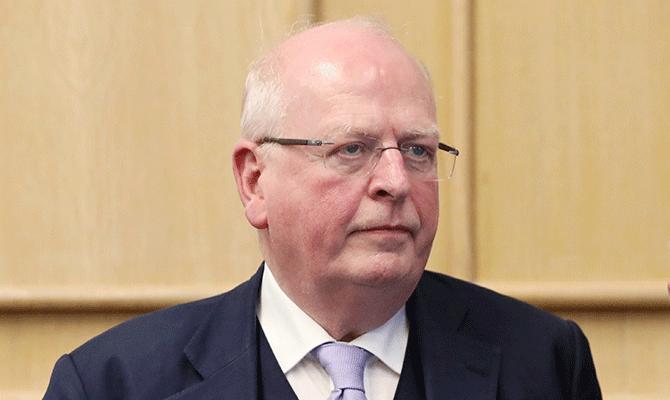
Michael McDowell
MICHAEL McDOWELL was the stand-out personality in the referendums campaign and his elation at the count was visible as ‘no’ activists gathered eagerly around him. The same activists are aware that McDowell’s current agenda is greater than the binning of the constitutional amendments. The former tánaiste, justice minister and attorney general has, yet again, been plotting his comeback to the Dáil and government, with the referendums campaign a mere stepping stone to this goal. Recent manoeuvres have also included talks with other parliamentarians to form an alliance with a common programme – talks that are likely to resume in the near future. Such a move, if successful, could alter the Dáil arithmetic and post-election coalition talks.
McDowell has threatened to come back before every general election since his ignominious defeat and ‘retirement’ at the 2007 election. In 2009 he engaged in intense negotiations with Fine Gael to rejoin his political alma mater but the Blueshirts lost their nerve when it came to actually taking back the enfant terrible of the Grand Old Party.
Shortly after the 2011 election, McDowell triggered a flurry of political activity by calling for a “right-of-centre” grouping that saw various heavyweight Independents such as McDowell, Shane Ross, Lucinda Creighton and Denis Naughten flirting and competing with each other simultaneously.
However, the outspoken Independents proved to be as paranoid about McDowell as his old party was, on top of which his constituency of Dublin Bay South (DBS) was shared with Creighton, providing an irresolvable problem. (Lucinda sweetly suggested he remove himself to the adjoining constituency of Dublin South.)
Ross was even more hostile to McDowell, knowing he would not be the dominant figure in any group that included the former head of the Progressive Democrats. So it was back to the drawing board for McDowell again.
In what appeared to be a small but significant shift to the left (everything is relative, comrades), McDowell called for a “pop-up-centre/centre-right party” before taking his NUI Seanad seat in 2016.
In the following years the once decidedly ‘centre-right’ champion worked with various politicians on a variety of issues – Sinn Féin MEP Lynn Boylan in an effort to draft an anti-media monopoly bill; FG grandee Maurice Manning on Seanad reform; various politicians on Brexit; and so on.
Michael McDowell also made sure to champion other vital issues such as the local property tax, which persecutes home owners in Dublin to the benefit of cosseted culchies; the “Metro link madness”; and home ownership – all issues that affect middle-class Dublin voters in areas such as McDowell’s Ranelagh home base.
Meanwhile, the senator’s apparent devotion to Manning’s Seanad reforms included an interesting observation on his website in 2017 – the seven “important constitutional functions” enjoyed by the Seanad included one that said “up to two members of the Seanad may be appointed to cabinet as government ministers”. Was it modesty that persuaded the senator to subsequently delete this ‘constitutional function’ from the list he published in his local literature? That literature has been composed of expensive and carefully prepared brochures expounding on national and constituency issues in the years since he was cast out of the Dáil in 2007.
In what was his third preparation of an election campaign, a bumper brochure at the start of 2020, just a few weeks before the general election, was stuffed with trenchant comment on housing, the iniquitous property tax, Dublin Bus, safe cycling and so on. This was circulated to the hovels of Ranelagh, Donnybrook, Sandymount, Terenure and other deserving areas of DBS. Nevertheless, McDowell yet again retreated, although he successfully ran once more for the Seanad.
Since then, Michael McDowell has used his platforms in the Business Post and the Irish Times to build a new Mark 11 McDowell, presenting still as centre-right but more comprehensive in his opinions and less abrasive than the “radical or redundant” soundbite he made famous.
VERBAL SADISM
He has, however, targeted the quietest boy in the DBS class, Green head prefect and climate minister Eamon Ryan. Big Mick regularly picks on shy Eamon with taunts such as “piffle about sod turf, lettuce in window boxes… no time for wand waving or wishful thinking… highly irrational” and so on.
Despite his penchant for verbal sadism, there is usually method to McDowell’s mania. He knows that Ryan is one of the most unpopular ministers and that his seat in their shared constituency may be vulnerable. At the same time, he has not forgotten that the threat of Sinn Féin is central to FG voters’ anxieties. Thus, he maintains a regular stream of invective and polemic against SF on many issues, including a border poll and even SF’s housing policies, the party’s strongest suit.
McDowell will be 73 in May but, apart from his age, he can hardly posture as a Dáil candidate and resile yet again without inviting jibes about the Grand Old Duke of York. Also, he now has an impressive political victory under his belt that will not be forgotten this side of the next general election. It really is now or never.
There are other factors in favour of a rebirth of his brand of ‘centre-right’ politics. Leo Varadkar and FG are a tired, flaccid political force. The party has been in power for 13 years and has long since abandoned its guiding, ideological tenets as well as much of its core, middle-class following.
Fianna Fáil appears rudderless and has discarded its working-class base, while leader Micheál Martin might as well be a member of FG. Meanwhile, the main personalities in both parties appear to be waiting for sinecures in Euroland.
The Greens are most unpopular and are attracting hostility that affects all three Government parties.
McDowell can see that the post-election arithmetic will probably resemble the second-last election result (2016). If FFG want to remain in power, they will require a group of Independents similar to Shane Ross and Finian McGrath’s Independent Alliance over eight years ago. This grouping would require that six or so TDs with ‘centre-right’ politics come together on a relatively loose platform under a leadership of sorts (called Michael McDowell). The politics of this group would veer markedly to the right and would play it tougher than the current Government on immigration.
Michael McDowell was pictured with several TDs and senators at the referendum count and two of the TDs – Wexford’s Verona Murphy (formerly FG, now Independent) and Galway West TD Noel Grealish (a former Progressive Democrats TD and a strong supporter of McDowell back then) – have highly contentious records on immigrants.
Murphy once suggested that asylum-seeker children as young as four years old need to be “deprogrammed” as they may have been “manipulated by Islamic State”. In an interview with local radio in RTÉ in December 2019 she asked: “Do we have to wait to have a London Bridge incident on Wexford Bridge?”
The same year, Grealish said there were “people coming over here from Africa… to sponge off the system here in Ireland” and he used the Dáil to speak of billions of euros being sent from Ireland to Nigeria. He also said that he exempted certain immigrants from these allegations, namely, “Christian… genuine refugees who were persecuted… because they were Christian by ISIS”.
In 2004, when then justice minister McDowell still believed it was necessary to be either radical or redundant, Grealish was at one with him in moving the overwhelmingly successful referendum to restrict the citizenship rights of Irish children born to non-nationals. That proposal was branded as an encouragement to racism by various TDs and the leadership of the Labour Party.
It would be unfair to say that Michael McDowell is a racist but if the new alliance identifies immigration as an issue to distinguish itself from Government parties, as appears likely, McDowell and his colleagues will have to tread carefully. In a coyly worded article early last year, McDowell tackled the question as follows: “We have a national right and duty to determine migration policy. Our government must exercise that right carefully. Half thought-out proposals to extend asylum rights to climate refugees are not helpful.
“If we want to avoid creating a space for far-right politics in Ireland, we need our elected politicians and government to respect and value the people’s sense of cohesion and common interest”.
The politics of the group will rest on the notion that a government should focus on bread-and-butter issues rather than culture wars, with a return to competence in the administration of housing, health and the economy at a time when the exchequer is overflowing with extra billions in tax revenues.
The putative alliance is also likely to take a hard line with the Greens and Michael McDowell has thundered about the dangers of “blindly adhering to climate change goals”.
There will, of course, also be a hard line taken with SF. In October 2021, McDowell’s IT column denounced the Government’s alleged practice of giving in to every demand on the exchequer for post-Covid recovery programmes, among other things. The print article was headlined, “Is there room for another political party”, but the online version had the headline, “Is it time for return of the Progressive Democrats?”
NGOs, meanwhile, can expect to be targeted like left-wing Hollywood script writers in the 1950s.
Former MEP Marian Harkin TD – once a member of FG, like McDowell – and ex-Labour TD Michael McNamara have engaged in talks with McDowell, as has McDowell’s former special advisor in government, Cormac Lucey, who has declared his intention to stand as an Independent in Blackrock, Co Dublin, in the local elections. It is likely that Lucey will go for the Dáil if he wins a council seat.
These talks have produced little so far apart from a recognition that the two Independent TDs are anxious for a government role. When the current coalition was being formed, both of them held talks with FF/FG under the misapprehension that they could become junior ministers.
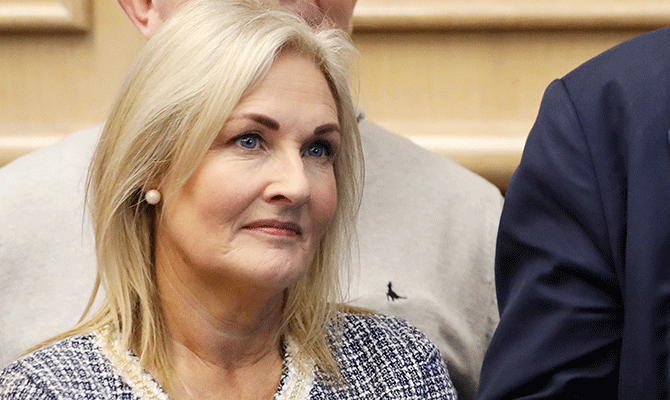
Verona Murphy
AGREEMENT
Negotiations about a deal between McDowell, Murphy, Grealish, Harkin, McNamara, Lucey and other possible recruits are less urgent since the dramatic referendums result. The view is that the Government would not dare rush to the polls so soon after that defeat, meaning that McDowell has time to hone a political document and programme acceptable to interested fellow travellers. But the current hiatus has little to do with ideology and the real problem for this alliance will be how to reach agreement in advance on who is likely to get what in a new right-of-centre cabinet and list of junior ministers.
For McDowell there also remains the question of how to win a seat in DBS. SF’s Chris Andrews will retain his seat; there will surely be one FG seat (James Geoghegan or Emma Blain); either Ryan or Labour leader Ivana Bacik, but not both, will take a seat: and the fourth will be a battle between McDowell and Fianna Fáil’s Jim O’Callaghan.
Michael McDowell knows there is a space somewhere between FG and the loud, unsavoury crew that definitely are to the right of centre but whose members have little to offer the electorate on economic ‘bread-and-butter issues’ and who are unlikely to win a single seat in the next Dáil. Michael, however, could lead half a dozen or so TDs into government and influence it way beyond its real political weight – as before.



